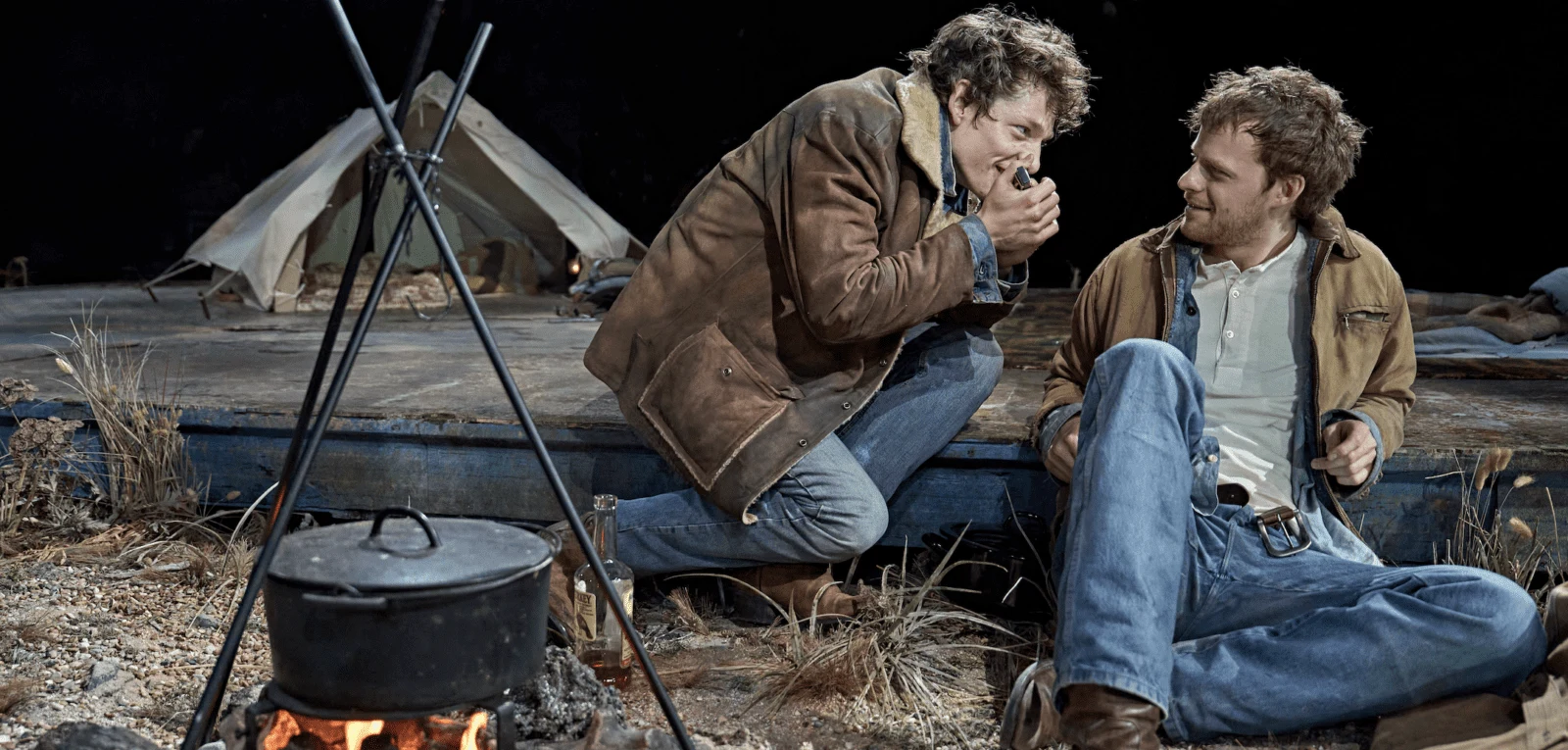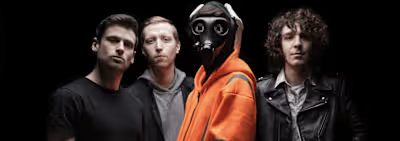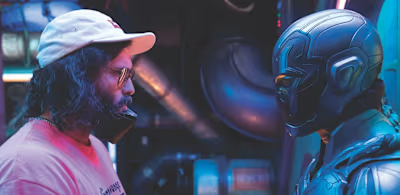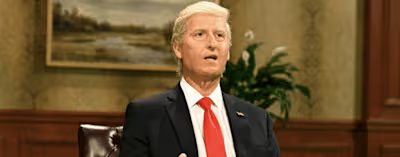An adaptation of ‘Brokeback Mountain,’ written in Brooklyn and …

From left: Mike Faist as Jack and Lucas Hedges as Ennis (Photo by Manuel Harlan)
"I have seen lives destroyed in the wake of closeted, married gay men," says Ashley Robinson about the urgency of his adaptation
You may think you know “Brokeback Mountain,” but you’ve never seen it like this.
Actor-turned-playwright Ashley Robinson has adapted the beloved novella for the stage, and it’s entering its final month of performances @sohoplace theater on the West End. He was with the production team in London from rehearsals to opening night and just flew back home to Brooklyn when we spoke. Robinson lives and works from his apartment on the line between Bushwick and Bed-Stuy.
The very existence of his adaptation is an unlikely thing: It was born out of a cold email he sent “Brokeback Mountain” author Annie Proulx in which Robinson explained how he would develop the material if he were given permission to adapt it into a play. Proulx was delighted with his ideas and gave him permission to bring the story of tortured gay cowboy love to a new generation.
Set in 1963, “Brokeback Mountain” takes place in a rural community of Wyoming where people live in extreme poverty. When Ennis (Lucas Hedges) and Jack (Mike Faist) take jobs on the isolated Brokeback Mountain, their lives are changed forever when they make an unexpected emotional and sexual connection. The play is directed by Jonathan Butterell with songs by Dan Gillespie Sells.
Robinson sat down with Brooklyn Magazine to discuss how “Brokeback Mountain” played an important role in his own first relationship 20 years ago. He explains how, despite the progress made for LGBTQ+ people since then, why it’s important to keep telling stories about the closet (because there are plenty of people still in it). The playwright also talks about Proulx’s ongoing support of the adaptation — hints at whether it will be staged in New York.
“Brokeback Mountain” is being called your debut as a playwright, but I’m sure you’ve written before?
It’s the first play I’ve had fully produced, really. Everything else is in various stages of being workshopped. I have a musical called “Fall of ’94,” which is an autobiographical piece about the Susan Smith murders that took place in my hometown of Union, South Carolina. It’s being developed with Alabama Shakespeare. Next year is the 30th anniversary of the tragedy, and we’re hoping it coincides with the world premiere of the musical.
What were the Susan Smith murders?
A woman let her car roll into the lake with her two infant children in the back seat. Then she ran across the street and said, “A Black man abducted my kids and ran off with them.” The whole country went looking for ‘that man’ and her kids. You can imagine the underbelly of racial tension that it brought up in that area of the South. But all of that is in the background [of the play]. In the foreground are these five motley crew children in a backyard, in a back shed, putting on a haunted house that they do every year. This is all true: down the hill from the house was the lake where those kids were underwater for nine days.
Tell me how this staging of “Brokeback Mountain” came about.
I emailed the short story’s author, Annie Proulx, with a treatment. There were other playwrights who had submitted treatments, but she did not like them and turned them all down. At least, this is what I gleaned. She got back within a few hours and said, “This is our guy.” Just after my four-page treatment, which was much harder than writing the first draft, actually. I would much rather just sit down and write the thing than try to write it in a four-page treatment, but it worked,
What does Proulx think of your adaptation now that it’s finished?
Annie’s been incredibly loyal to it. She’s a wonderful woman and very grateful for this adaptation, I think because we really took it back to her story. She says people try to rewrite the ending as fan fiction. I think that’s because this story is so personal for so many people who have never felt seen. It was and is a cultural phenomenon. “Brokeback Mountain” was certainly the first time I identified with anything as a queer man. I’d never seen a rural gay love story. So it was really the first time I recognized myself, which is why I fell in love with it, tragic as it is.
Courtesy Ashley Robinson
Did you read the short story in The New Yorker before you saw the movie?
I read it with Joshua Park, my first love [and fellow actor], who I really made this adaptation for. We saw the “Brokeback” movie together in 2005 when I was in Chicago doing “Wicked.” Afterward, we immediately walked across Clark Street to the Borders bookstore, bought the book, went home, and read it out loud to each other.
He died very suddenly in 2015 at the age of 38, almost the exact same age as Jack Twist when he dies in the story. On Josh’s birthday that year, I wondered if I had that old copy of the story from Chicago, and I do … it’s right here. On the first day of rehearsal this year, [the cast] read the story out loud to each other and I thought, “Oh my god, full circle.” It’s all been so serendipitous how it’s come together this way.
You added the device of an older Ennis watching his younger self and Jack make love. Will you tell me about the thought process behind adding it?
That’s a tiny prologue in the book, but he’s not as old as I wrote him. The play is set in 2013 as a memory that unfolds out of older Ennis’s trailer. He still has not freed himself of regret and fear. Without giving away the ending, the older Ennis character resulted in me wanting to write a specific ending, and that’s what made Annie say yes to me writing the project.
Do you know any men like Ennis who live closeted lives?
My god, yes! As we watch everything regressing in our culture, as we watch rights being taken away, as we just watch all this unfolding, we have a generation coming up who think everything is fine and dandy. But I think we have a responsibility to tell these stories. If nothing else for history’s sake, but also to ignore them is bullshit because these stories still exist to this day.
Homophobia is rampant unless you’re in a bubble like New York. We have a responsibility to still tell these stories while also letting people tell stories of what we can be and how far we’ve come. This story tells how far we’ve come. I have seen lives destroyed in the wake of closeted, married gay men. I have seen it in my hometown and heard about it in many other instances. A human being in the closet and having to hide who they are leaves a wake of destruction that’s just immense. Yet the society they’re in will not allow them to come out and keep a job or have any sort of social standing. And it’s still going on all over America.
Progress usually doesn’t come in a big crashing wave — it comes in little waves in different places at different times.
And we’re seeing a backpedaling and regression right now that I hope is just birthing pains. The last administration emboldened the loud, fringe, far-right. They’re the loudest because these voices come out of small, isolated communities, and that’s what we tried to really do with this production, and I think we succeeded. It’s about the isolation and an unstoppable relationship between Ennis and Jack that somehow makes it through all that we were just talking about.
You adapted “Brokeback Mountain” from the short story and recently turned the play “Come Back to the Five and Dime, Jimmy Dean, Jimmy Dean” into a musical. Both of those original texts were adapted into movies, so I’m curious, do you want to see your adaptations made into new movies?
Wouldn’t that be interesting? Especially “Five and Dime.” I think it would be ripe for that and would be an amazing movie musical, as we’ve adapted it. “Brokeback”… you’ve got the film. We’re creating a piece of pure theater with “Brokeback,” which I think some people didn’t quite get. They wanted to come in seeing the film. It is such a cultural iconic thing, and I didn’t know I was being so bold by wanting to adapt this. But heck, you know, it’s off and running, and it’s gonna have its life.
Will you bring “Brokeback” to New York?
We’re exploring many avenues to bring it to New York. There’s lots of interest and conversations happening. And, you know, the right producer and the right theater will find us.
Like this project
Posted Sep 22, 2023
"I have seen lives destroyed in the wake of closeted, married gay men," says Ashley Robinson about the urgency of his adaptation.
Likes
0
Views
18





